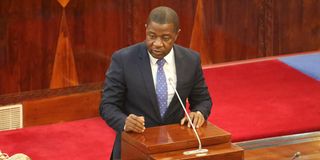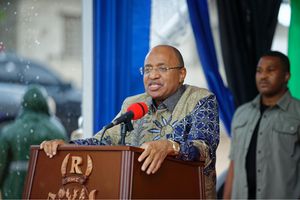Tanzania outlines plan to grow fisheries, livestock sectors next year

The minister for Livestock and Fisheries, Mr Abdallah Ulega. PHOTO | COURTESY
What you need to know:
- This will be achieved by strengthening the fishing capacity in the deep sea, continuing with the construction of the fishing port of Kilwa Masoko-Lindi, purchasing three high-seas fishing vessels, and issuing 55 high-seas fishing licences
Dar es Salaam. The government announced a number of initiatives yesterday in an effort to increase the contribution of the livestock and fishing industries to the national economy in the 2023/2024 financial year.
In his speech yesterday, the minister for Livestock and Fisheries, Mr Abdallah Ulega, asked Parliament to approve a total of Sh295.9 billion as a budget for 2023/24 financial year. This is an increase of more than Sh100 billion from Sh176.2 billion, which was allocated in 2022/23.
By approving the requested amount, Mr Ulega said the objectives of the ministry to improve the livestock and Fisheries sectors will be achieved to a large extent.
In the fisheries sector, the aim is to implement priorities that are consistent with connecting the blue economy, especially the sustainable use of fishing resources, including natural fishing and aquatic life development.
This will be achieved by strengthening the fishing capacity in the deep sea, continuing with the construction of the fishing port of Kilwa Masoko-Lindi, purchasing three high-seas fishing vessels, and issuing 55 high-seas fishing licences.
According to Mr Ulega, the government also aims to strengthen fishing institutions by building the necessary infrastructure and buying two glass-bottom boats to increase tourism in Marine Parks and Eco-tourism.
In the livestock sector, he noted they would enhance the availability of quality livestock seeds to improve livestock breeds and boost the availability of fodder, livestock food and water.
There is also a strategy to strengthen livestock health, improve extension services, establish and develop youth investment centres, and strengthen research and training services for veterinary professions. “In implementing the priorities (in the livestock sector), we will start irrigation schemes in the pasture fields of Vikuge and Langwira, as well as the NARCO ranches of Kongwa and Mzeri,” said Mr Ulega.
He said his ministry will build dams and deep wells for livestock water and establish 150 farms in local government authorities and ministry institutions.
They would also support 100,000 cows, continue to buy the best bulls and distribute them to breeding groups, and produce 1,500,000 doses of quality livestock seeds.
“We will identify and register on the electronic system approximately 40.6 million livestock to have accurate information for livestock improvement and meet market demand,” he said.
In fisheries, he said they will establish the Fishery Resource Management Authority and continue collaborative protection by patrolling for 8,400 working days, strengthening 50 groups for collaborative management of fishery resources, and providing education to 360 fishermen.
“Through a low-cost loan programme, this will enable fishermen and aquatic life breeders to obtain inputs and contemporary fishing equipment, including 160 boats and 893 cages,” he said.
Charles Mwijage, Member of Parliament for Muleba North constituency, said that there was a need for the budget of the Ministry of Livestock and Fisheries to be increased due to the importance and great work that needs to be done to make the sector’s potential reflect in the economy.




